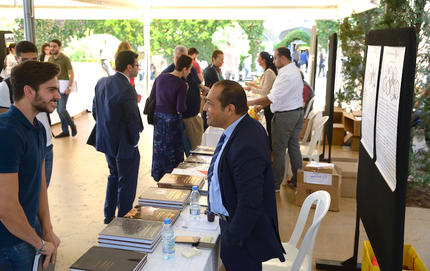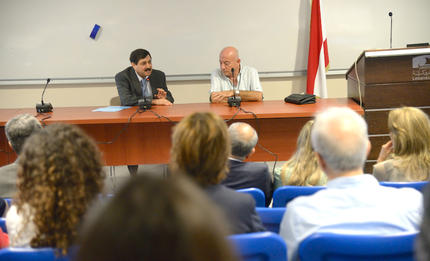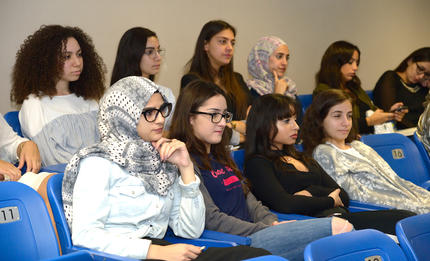Translation as custodian of cultures and channel of communication
On International Translation Day, LAU’s Translation Program at the Department of Humanities invites language professionals to offer their insights into the age-old profession.

In celebration of International Translation Day, the Translation Program at the Department of Humanities hosted a series of lectures and a fair for publishers of translated books at LAU’s Beirut campus. The event honored an age-old profession that has connected civilizations across the barriers of time and space.

In celebration of International Translation Day, the Translation Program at the Department of Humanities hosted a series of lectures on October 10 at LAU’s Beirut campus. The event honored an age-old profession that has connected civilizations across the barriers of time and space.

Collectively, the speakers urged students to maintain integrity in their work and strive to widen their linguistic knowledge and cultural awareness — the reasons, as it turned out, the predominantly female translation students from LAU had chosen the field.
In celebration of International Translation Day, the Translation Program at the Department of Humanities hosted a series of lectures on October 10 at LAU’s Beirut campus, in the presence of Nashat Mansour, dean of the School of Arts & Sciences. The event honored an age-old profession that has connected civilizations across the barriers of time and space.
“We shed light on the immense efforts by translators around the world to bridge the gap between cultures, and promote dialogue and understanding so that universal peace and harmony can prevail,” said Translation Program Coordinator Nuwar Mawlawi Diab, who organized the event.
The guest speakers — from publishers to academics — offered their translation strategies and insights into the main challenges and future prospects of the domain.
Welcoming the guests, Chair of the Department of Humanities Paul Tabar said: “I am fully confident that today’s discussions will be rich in new information that will encourage researchers to conduct more studies in order to help us improve our abilities in translation and find the best ways to teach it to our students.”
In their respective talks, Director General of the Arab Organization for Translation Haitham al-Nahi, and George Abdel-Massih, head of the dictionaries section at Librairie du Liban Publishers, warned against neglecting the Arabic language, the cornerstone of our heritage and society.
Al-Nahi underlined his organization’s role in consolidating the Arabic language through intellect and knowledge. He pointed to the lack of readership in the Arab world, and the dire state of cultural knowledge that has limited the historically rich Arabic language to the sphere of verbal communication. “Imagine a nation of 150 million inhabitants where 1000 copies of a book are not sold out. What kind of a nation is this? We must create a nation that reads in order for us to develop and prosper,” he lamented.
Abdel-Massih, in turn, spoke passionately about the correlation between dictionaries and modern culture, the means to preserve it, and the problems currently faced in producing dictionaries. He criticized those who undermine the dictionary-culture dynamic, “destroying the dictionary, the culture and the Arab language that they claim to defend.”
Offering a broader perspective, speaker Nidale Noun, head of Conference Services at the United Nations, highlighted the pivotal role that translation played in the organization, as a channel for cross-cultural communication and conflict resolution. “The United Nations is a universal environment,” she said. “It needs to be close to the local communities, voice their concerns, and convey to them its agendas and plans in development, peace and security.” Translation, she added, is essential to facilitating this dialogue and mutual understanding, and sometimes to mitigating conflicts.
Collectively, the speakers urged students to maintain integrity in their work and strive to widen their linguistic knowledge and cultural awareness — the reasons, as it turned out, the predominantly female translation students from LAU had chosen the field.
“Language is fundamental to understanding a culture, and I want to be like a crossing bridge between different cultures around the world,” said Lebanese-Canadian translation major Fatima Akhdar. Senior translation student Aya Abi-Issa, meanwhile, had stumbled upon on translation after switching majors and discovering a passion for linguistics, “because there is a lot in translation and linguistics, the small things that nobody notices except for translators.”
Addressing the integrity of a translated literary text, Rula Baalbaki, an instructor at the Department of English at AUB, spoke about translation strategies to preserve the identity of creative writing found in the original text. Treating participants to a number of poems, Baalbaki asked them to compare the translated texts with the originals, all while demonstrating the failures and benefits of using certain methods.
The event ended with a contest during which students huddled in groups to render into Arabic a short text by award-winning journalist Peter Gumbel. Enthusiastic chatter filled the conference room as they debated the mot juste — the exact word to convey meaning.
More
Latest Stories
- Future Pharmacists Take Their First Step into the Profession
- Breastfeeding Support Room Inaugurated at LAU
- LAU GASC Launches the Advisory Taskforce for Recovery, Reforms, and Development
- Engineers and Researchers Flock to LAU for the Fifth IEEE MENACOMM 2025
- Medical School Faculty Receives a Programme Hubert Curien–CEDRE Grant
- Dr. Yasmine Nachabe Taan on Arab Design Education
- LAU Dedicates the Gelnar A. Rbeiz Conference Room
- New Student Members Share LAU Governance

